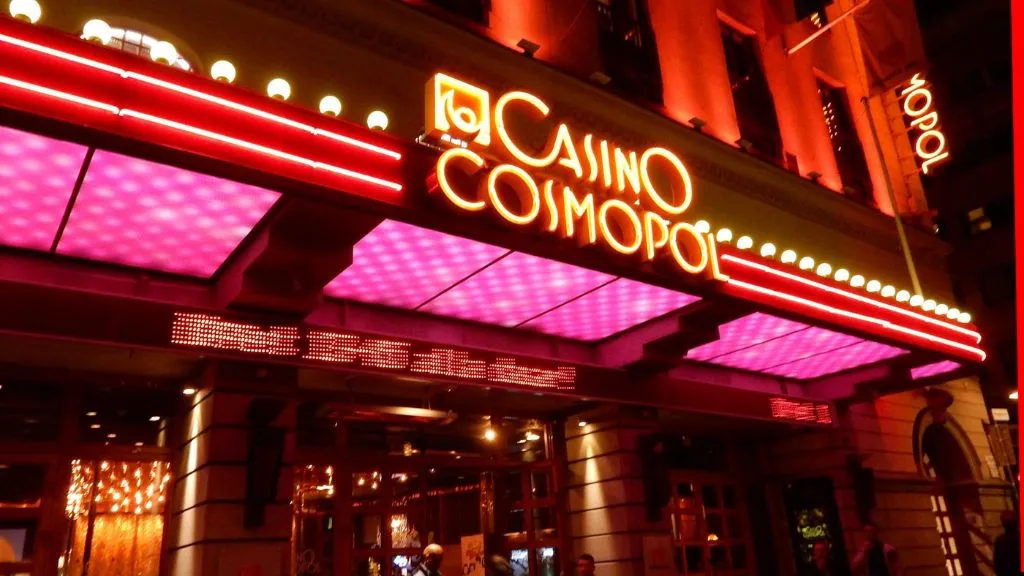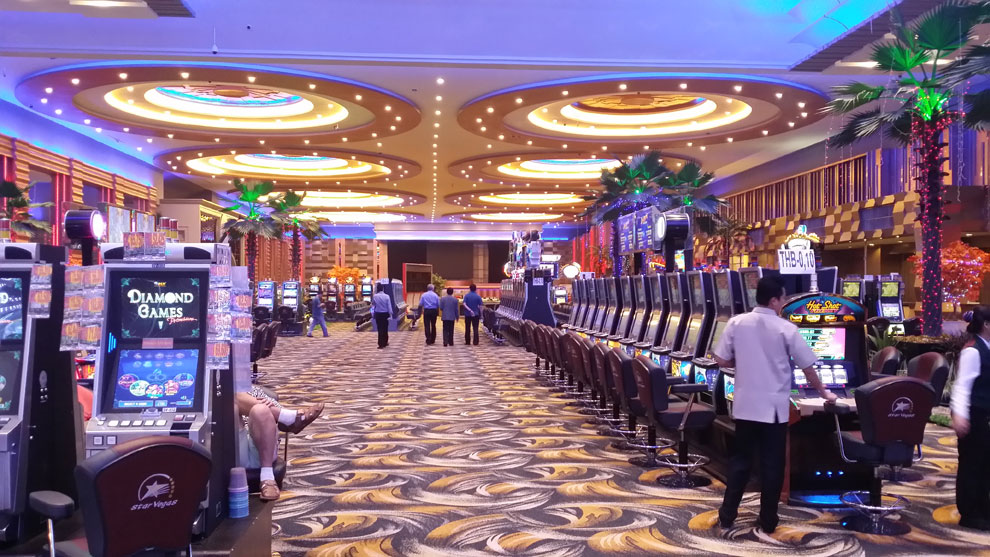On April 24, 2025, the last land-based casino in Sweden — Casino Cosmolot in Stockholm — had its final day of operation.
The operator Svenska Spel, which managed land-based facilities in the country, confirmed that from this point on, Sweden’s gambling industry will continue to develop exclusively online.
Earlier this month, the Swedish Parliament voted to ban offline casinos starting January 1, 2026.
Technically, Svenska Spel could have kept Casino Cosmolot running until the end of the year, but due to changes in ownership structure, the closure had to happen much earlier.
The closure left 240 employees without work, and labor unions are already stepping in to provide assistance.
A Historic Moment: The Closure of Sweden’s Last Casino
On April 24, 2025, an entire era came to an end in Sweden — the country’s last land-based casino, Casino Cosmolot in Stockholm, ceased operations. That evening, as music still played and the final guests lingered around the poker and roulette tables, it became clear: land-based gambling in Sweden was becoming a thing of the past.
Cosmolot was more than just a casino. Opened on March 13, 2003, in the heart of the capital, it was housed in the former Palladium cinema — a building with a rich cultural history. Over more than two decades, Cosmolot became a landmark for gambling enthusiasts and a symbol of legal and regulated gaming in the country. For many players, it wasn’t just about gambling; it was about an atmosphere that online formats lack — live interaction, the visual elegance of the interiors, the sounds of real slot machines and chips, and emotionally charged evenings.
The closure of Cosmolot didn’t come as a surprise. The decision to shut down land-based casinos was made by the Swedish Parliament in early April 2025. Although the official ban will take effect on January 1, 2026, Casino Cosmolot opted not to wait until the end of the year. The early closure was due to changes in the ownership structure of its operator — the state-owned gambling giant Svenska Spel.
Thus, April 24 was not just the last working day for a single venue — it marked the end of an entire chapter in Sweden’s land-based gambling industry. For the first time in decades, there will be no physical casinos operating on Swedish soil.
Public reaction has been mixed. Some see the decision as a logical step toward modernization and digitalization of the industry. Others express regret over the loss of a place that was part of urban culture — a place where people could experience gambling in its “classic” form, free from the confines of a smartphone screen.
Reasons Behind the Closure of Offline Casinos in Sweden
The closure of Sweden’s last casino is not just an isolated event, but the result of a series of long-developing factors. The decision by the Swedish Parliament on April 2, 2025 — which officially bans land-based casinos starting January 1, 2026 — was the culmination of these trends.
Declining Interest in Offline Casinos
One of the key reasons was the clear decline in public interest toward traditional forms of gambling. Over the past decade, consumer behavior has changed significantly. People have been visiting physical venues less frequently, opting instead for the convenience of online gambling. All that’s needed is a smartphone or a computer — and the game is available anytime, without the need to travel to a casino.
According to public data, attendance at Casino Cosmolot had been decreasing even before the COVID-19 pandemic, and never fully recovered afterward. In 2024, the Stockholm branch generated $16.9 million in revenue, while Svenska Spel’s online and lottery segments posted much higher numbers. For instance, Svenska Spel Tur, the lottery brand, brought in $525 million over the same period. The numbers speak for themselves: players are increasingly choosing digital platforms.
Global Trends and Digitalization
Amid global digitalization, many countries have begun reassessing their stance on traditional gambling formats. Sweden — a highly technologically advanced country with strict social regulations — has followed this global trend. Online gambling continues to grow in popularity not only due to convenience but also because it is easier for the government to monitor and regulate through modern oversight and self-exclusion systems like Spelpaus.
Moreover, land-based casinos come with significantly higher operational costs — rent, staff, security, logistics. Online platforms, on the other hand, allow operators to cut expenses while maintaining or even increasing their margins. This is economically beneficial for both the companies and the state, which collects steady tax revenues from the digital sector.
Political and Social Arguments
During the 2025 parliamentary debates, the discussion went beyond economics to include social responsibility. Some politicians and public organizations argued that physical casinos contribute to the development of addictive behaviors, particularly among certain age groups and socially vulnerable populations. While online gambling also poses risks, advocates of the ban claimed that digital formats offer more tools for self-control, such as time limits and self-exclusion features.
Interestingly, the cultural impact of casinos also came up in the debate. Some MPs described casinos as “a relic of the 20th century” and stated that Sweden should keep pace with the times by abandoning formats that no longer reflect a modern lifestyle.
The Operator and Regulator’s Position
Despite losing a part of its business, state-owned operator Svenska Spel supported the Parliament’s decision — likely because the company has long been focused on expanding its online offerings, including lotteries, betting, and digital casinos. For Svenska Spel, the closure of physical casinos is not a collapse but a step in a broader business transformation.
The gambling regulator, Spelinspektionen, expressed concern that banning land-based venues could drive more players toward illegal offshore platforms, especially those who distrust state-run or licensed online operators. This presents a new challenge: how can regulators maintain control over the market in a fully digital gambling environment?
The Role of Svenska Spel and Government Regulation
To understand how Sweden’s gambling industry arrived at the closure of its final land-based casinos, it’s essential to examine the role of the market’s key player — Svenska Spel — as well as the system of government regulation developed in the country over recent decades.
What is Svenska Spel?
Svenska Spel is a state-owned company established in 1997, and for over 25 years, it has managed the main segments of legal gambling in Sweden. The company owns brands related to lotteries, sports betting, online casinos, and — until recently — land-based casinos. Svenska Spel was responsible for the operation of the Casino Cosmopol chain, with branches in major cities such as Stockholm, Gothenburg, Malmö, and Sundsvall.
The company’s purpose was not only to centralize the management of gambling but also to minimize potential harm to players and society at large. Svenska Spel operates under a unique mandate: to generate revenue for the state while acting responsibly, managing risks, and limiting access for vulnerable groups.
Why Did Svenska Spel Support the Ban?
At first glance, the decision to close land-based casinos might seem unexpected. However, in the context of Svenska Spel’s strategic direction, it makes perfect sense. In recent years, the company has actively invested in digital products — especially after the liberalization of Sweden’s online gambling market in 2019. That shift allowed new private operators to enter the market under licenses from Spelinspektionen, significantly increasing competition.
Svenska Spel understood that the future lies online. A transformation began within the company. The closure of the Cosmolot branches in Gothenburg and Malmö in 2024 was the first step. At the time, it was attributed to “unsustainable costs,” but in reality, it marked the beginning of a phased shutdown of the entire network.
By the time Parliament voted in April 2025, Svenska Spel had little incentive to maintain its land-based operations. Moreover, changes in the company’s ownership structure accelerated the closure of the Stockholm branch. The company’s leadership acknowledged that a “focus on digital channels” was the right strategic move.
The Role of Spelinspektionen — Sweden’s Gambling Regulator
All gambling operations in Sweden are tightly regulated by Spelinspektionen (the Swedish Gambling Authority). This body is responsible for issuing licenses, enforcing compliance, protecting player rights, and combating illegal operators.
Spelinspektionen plays a dual role: on one hand, it supports the government’s digitalization and tightening of regulations; on the other, it remains concerned about associated risks. After the ban on offline casinos was announced, regulators publicly voiced fears that some players may turn to the black market — using unlicensed offshore sites that do not follow rules for player protection or responsible gambling.
Additionally, Spelinspektionen is advocating for stricter control measures in the online sector, such as enhanced identity verification, improved self-exclusion systems, and more rigorous checks on sources of funds. All of this is aimed at ensuring that Sweden’s high standards of “socially responsible gambling” are preserved, even in a fully digital environment.
The Economic Side: Declining Revenue and Changing Priorities
The decision to close land-based casinos in Sweden is driven not only by political and social factors but also by clear economic reasons. Despite the symbolic importance of Casino Cosmolot to Sweden’s gambling industry, its financial performance in recent years no longer justified the large investments and operational costs.
Financial Results: Numbers That Speak for Themselves
In 2024, the revenue of Casino Cosmolot in Stockholm was only $16.9 million. This is quite modest, especially considering that it is the last and largest land-based casino in the country, located in the capital. In comparison, the lottery division of the same operator, Svenska Spel — the Svenska Spel Tur brand — generated $525 million for the state over the same period. The difference is more than 30 times.
This stark contrast clearly illustrates where Swedish players’ interests lie today. Lotteries and online gambling are more accessible, familiar, and mass-market forms of entertainment. Meanwhile, land-based casinos are becoming niche products, appealing only to a narrow group of players and tourists.
High Costs of the Offline Format
Land-based casinos are high-cost businesses. Renting large spaces in central urban areas, maintaining staff (for example, Cosmolot in Stockholm employed around 240 people), security, IT infrastructure, licensing expenses, and compliance with safety standards — all of this requires continuous and significant expenditure.
In the face of declining demand, such costs become economically unsustainable, especially when compared to online casinos, which can serve far more customers at lower costs and with greater flexibility.
For instance, a single developer can create a slot game that generates daily revenue for thousands of users without the need to maintain physical equipment, provide security, or schedule dealers for shifts. Online platforms operate around the clock, process payments instantly, and can offer personalized promotions to each customer based on data — something that offline casinos can never match.
Shift in Investment Strategy
Against the backdrop of these figures, it becomes clear why Svenska Spel decided to reassess its priorities. Investing in the development of online platforms, marketing digital products, and innovative solutions like mobile apps, game streaming, and live dealer casinos is a direction that ensures growth and competitiveness in the long term.
Moreover, at the state level, there is also a reorientation of resources. Regulation, oversight, self-control programs, and gambling addiction prevention are now predominantly focused on the online sector, where there is the ability to closely monitor player behavior and intervene promptly when necessary.
The Closure of Land-Based Casinos as a Release from Burden
In essence, Casino Cosmolot and the other land-based branches of Svenska Spel had ceased to be strategic assets in recent years and had become a burden. Their closure is not only a political or symbolic event but also a logical business move: freeing up resources and focusing on the segments that are genuinely growing and delivering results.
Cultural and Symbolic Significance of Casino Cosmolot
The closure of the last land-based casino in Sweden is not just an economic and technological move, but also a cultural moment that will affect many Swedes. Casino Cosmolot in Stockholm was not just a gambling establishment but a part of the city’s culture, a symbol of the long history of gambling in the country.
The Historical Significance of the Building
Casino Cosmolot was located in one of the most iconic buildings in Stockholm — the former Palladium cinema. This building, constructed in the 1920s, was known as a venue for large cultural events and attracted people from all walks of life. In 2003, when the casino opened its doors, it became part of a new cultural era — an era when gambling started to be strictly regulated by the state and made accessible to a wider audience.
For many locals and even tourists visiting Stockholm, Cosmolot was considered a part of the city’s cultural landscape. Players, in one way or another, were not just engaging in a game but were part of a society that followed the trends in the industry, the new formats of gambling entertainment. The atmosphere of land-based casinos — the shuffle of cards, the music, the live interactions, the evening tournaments — will forever remain in the memories of those who experienced that era.
Nostalgia and Societal Reaction
It’s no surprise that the decision to close the casino sparked nostalgic feelings in many Swedes. Despite the rise of online gambling, for many, Cosmolot remained not just a place to play but a part of their personal memories and an important piece of the Stockholm cityscape. With the casino’s closure, not only does a well-known establishment disappear, but also the way people interacted with gambling in person. This loss is perceived as a symbolic end to an entire era.
Of course, in an online format, players can access the same games, but the atmosphere of a real establishment, the interaction with friends, and the sense of physical presence at an event — cannot be replicated through a screen. For a generation that grew up visiting such venues, this closure marks the end of an important chapter in their lives.

 Companies
Companies 





